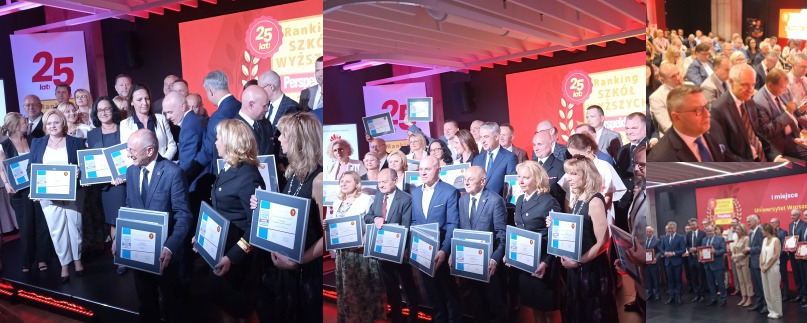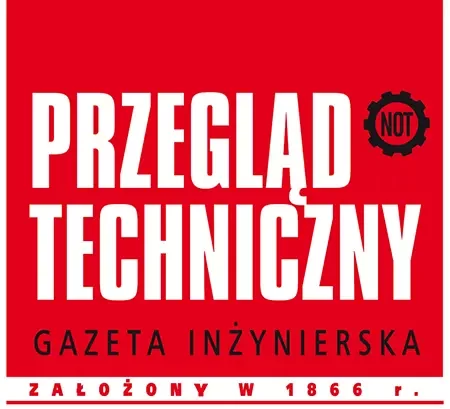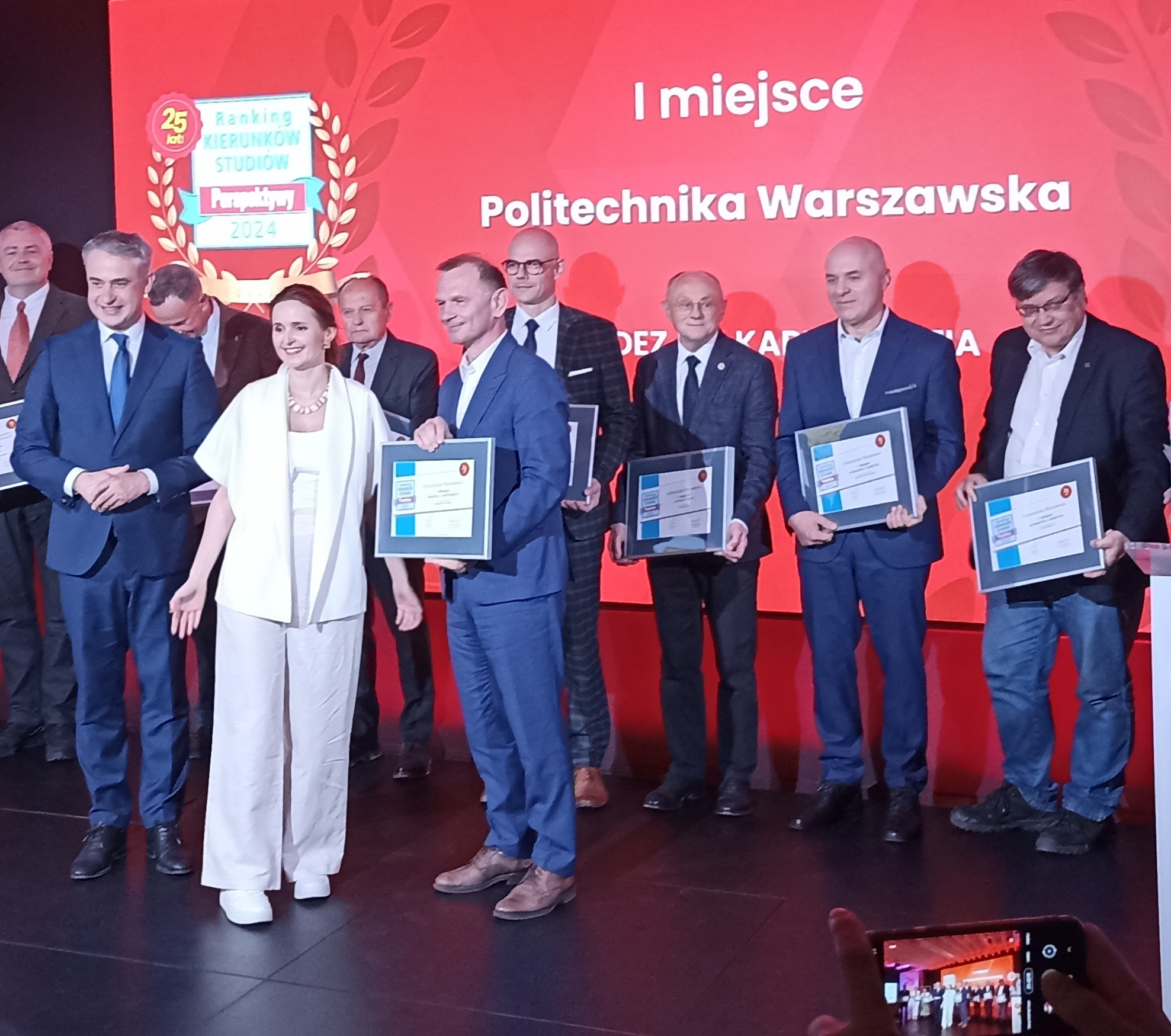Once again, the Warsaw University of Technology has proven to be the best technical university in Poland. This is the result of the XXV Ranking of Higher Education Institutions – Perspektywy 2024, the final of which took place at the Central House of Technology in Warsaw (26.06.2024).
During the ceremonial Gala summarizing the XXV Ranking, the diplomas were presented to the winners of the individual rankings by Krzysztof Gawkowski – Deputy Prime Minister and Minister of Digital Affairs and Maciej Gdula – Undersecretary of State in the Ministry of Science and Higher Education, accompanied by the organizers and members of the Ranking Chapter. The best Polish academic university was the University of Warsaw, the best non-public university was the Leon Kozminski Academy in Warsaw, and the best public university in the ranking of academies of applied sciences (ANS) and public vocational universities (PUZ) was the University of Kalisz named after President Stanisław Wojciechowski.
Ranking Chapter
- prof. Michał Kleiber, former president of the Polish Academy of Sciences, chairman of the Chapter
- prof. Marek Safjan, judge of the European Court of Justice
- prof. Wiesław Banyś, former chairman of KRASP
- prof. Krzysztof Diks, Faculty of MIM, University of Warsaw
- prof. Bogusław Smólski, former Rector-Commandant of the Military University of Technology
- prof. Marek Krawczyk, former rector of the Medical University of Warsaw
- Edyta Demby-Siwek, President of the Patent Office of the Republic of Poland
- Dr. Jarosław Protasiewicz, director of OPI
- Włodzimierz Kiciński, Vice President of the Polish Bank Association
- Tomasz Psonka, Director of Elsevier in Central and Eastern Europe
- prof. Janusz Uriasz, Chairman of the Polish Accreditation Committee
- Waldemar Siwiński, head of the University Ranking
During the ceremonial Gala summarizing the XXV Ranking, the diplomas were presented to the winners of the individual rankings by Krzysztof Gawkowski – Deputy Prime Minister and Minister of Digital Affairs and Maciej Gdula – Undersecretary of State in the Ministry of Science and Higher Education, accompanied by the organizers and members of the Ranking Chapter. The best Polish academic university was the University of Warsaw, the best non-public university was the Leon Kozminski Academy in Warsaw, and the best public university in the ranking of academies of applied sciences (ANS) and public vocational universities (PUZ) was the University of Kalisz named after President Stanisław Wojciechowski.

The top five technical universities have remained basically unchanged for years. Second on the podium was the AGH University of Science and Technology. St. Staszica in Kraków, third place goes to Gdańsk University of Technology, followed by Wrocław University of Technology, and the top five is closed ex aequo by the Łódź and Poznań University of Technology.
The results of the ranking of technical studies are worth reading carefully. It included 22 courses, in which the winners were:
Architecture: Krakow University of Technology Tadeusza Kościuszki
Automation and robotics: Poznań University of Technology
Biotechnology: Warsaw University of Technology
Construction: Wrocław University of Science and Technology
Electronics and telecommunications: AGH University of Science and Technology. St. Staszica in Krakow
Electrical Engineering: Warsaw University of Technology
Technical Physics: AGH University of Science and Technology. St. Staszica in Krakow
Environmental Engineering: Gdańsk University of Technology
Energy: Warsaw University of Technology
Logistics: Poznań University of Technology
Aviation and space science: Warsaw University of Technology
Materials Engineering: Warsaw University of Technology
Geodesy and cartography: Warsaw University of Technology
Mining and geology: AGH University of Science and Technology. St. Staszica in Krakow
Biomedical Engineering: AGH University of Science and Technology. St. Staszica in Krakow
Computer Science: Warsaw University of Technology
Chemical Engineering: Wrocław University of Science and Technology
Mechanics and machine construction: Warsaw University of Technology
Transport: Warsaw University of Technology
Mechatronics: AGH im. St. Staszica in Krakow
Chemical Technology: Warsaw University of Technology
Management and production engineering: Warsaw University of Technology
Jak sporządzono ranking? Jaka była jego metodologia, co brano pod uwagę i jaka była waga poszczególnych kryteriów. Tutaj organizatorzy i działająca w ich imieniu Kapituła rankingu, której przewodzi od lat prof. PhD. Eng. Michał Kleiber, has been gathering experience for a quarter of a century.
The ranking methodology covers Polish academic universities (public and private) that have the right to award doctoral degrees in at least one scientific discipline and have at least 200 full-time students and have had at least two graduating classes.
A detailed description of the criteria used to prepare the ranking is available on the organizer’s website – https://2024.ranking.perspektywy.pl/. In this article, we will only briefly present them along with the weight assigned to each criterion:
Prestige – 12%. This is an assessment made by academic staff – the number of times a given university was indicated in a survey among academic staff, and international recognition – a criterion measured by the university’s position in global academic rankings published in 2023.
Graduates on the labor market – 12%. This criterion consists of graduates’ salaries and their employment. The data includes graduates’ salaries and is related to unemployment rates in the graduates’ districts of residence. The source of the data is the Graduates’ Economic Fate Monitoring System (ELA)
Scientific potential – 13%. This criterion takes into account the evaluation of scientific activity (the sum of the grades (categories) awarded to individual disciplines that were assessed by the Commission for National Education at a given university; staff saturation with people with the highest qualifications; doctoral and postdoctoral qualifications and education of doctoral students in doctoral schools, measured as the ratio of the number of doctoral students educated in doctoral schools run by the university to the number of research and research-teaching staff.
Scientific efficiency – 30%. This is the effectiveness of obtaining financial resources for research (the indicator takes into account the differentiation in the cost of research between scientific disciplines); funds obtained from the EU framework programmes for research and innovation; development of own staff; scientific degrees awarded; publications – included in the SCOPUS database in relation to the total number of research and research-teaching staff; citations, and FWCI (Field-Weighted Citation Impact) – an indicator defining the ratio of the number of citations; FWVI (Field-Weighted View Impact) – an indicator defining the ratio of the number of views of the university’s publications to the average number of views received by similar publications and Top 10 (Publications in Top 10 Journal Percentiles) – an indicator defining the extent to which the university’s publications are present in the 10% of the most frequently cited journals in the world.
Innovation – 8%. Patents and protective rights in Poland and patents and protective rights abroad, as well as SDG – the contribution of university research to the implementation of the UN Sustainable Development Goals (Sustainable Development Goals – Agenda 2030).
Education conditions – 10%. This criterion includes the availability of highly qualified staff and accreditations – an indicator measured by the number of current accreditations and international certificates held by the university.
Internationalization – 15%. The number of foreign students in relation to the total number of students; those studying in foreign languages; ICI (International Collaboration Impact) – the average number of citations received by publications with a co-author from abroad; participation in a European university; the number of foreign academic teachers in relation to the total number of academic teachers; exchange of academic staff (trips) as part of the Erasmus+ Programme; student exchange – trips of students leaving for at least 3 months and incoming students – the number of students arriving as part of a foreign exchange; as well as the multiculturalism of the student environment, i.e. the number of countries from which at least 10 foreign students come.
Janusz M. Kowalski
Best Technical Universities 2024
1 Warsaw University of Technology
2 AGH University of Science and Technology named after Stanisław Staszic in Kraków
3 Gdańsk University of Technology
4 Wrocław University of Science and Technology
5= Lodz University of Technology
5= Poznań University of Technology
7 Silesian University of Technology
8= Cracow University of Technology Tadeusza Kościuszki
8= Jarosław Dąbrowski Military University of Technology in Warsaw
8= Lublin University of Technology
11 Polish-Japanese Academy of Information Technology in Warsaw
12 West Pomeranian University of Technology in Szczecin
13 Opole University of Technology
14 Białystok University of Technology
15 Częstochowa University of Technology
16 Politechnika Bydgoska im. Jana i Jędrzeja Śniadeckich
17= Koszalin University of Technology
17= Gdynia Maritime University
19 Kielce University of Technology
20. The Naval Academy of the Heroes of Westerplatte in Gdynia
21 Rzeszów University of Technology named after Ignacy Łukasiewicz
22 Maritime University of Technology in Szczecin
23= University of Bielsko-Biała
23= Kazimierz Pułaski University of Radom





